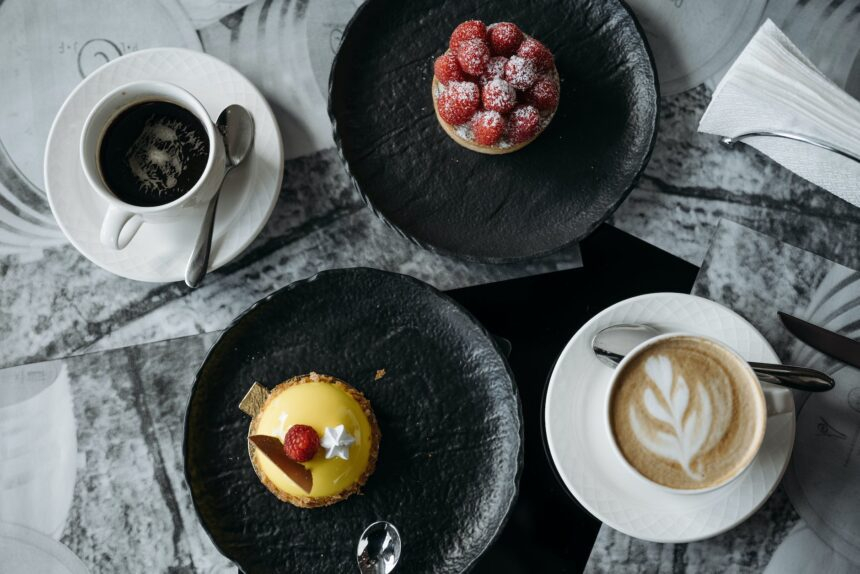Few people can get through the afternoon without a cup of coffee to get them through the morning. Although matcha has gained popularity recently, coffee has long been the preferred caffeinated beverage among adults in the United States. For the past decade or so, this earthy, Japanese powdered green tea has started making an appearance on grocery shelves, coffee and tea shops, bars, and restaurants, offering coffee enthusiasts another enticing alternative to grab on foggy mornings. What are the primary distinctions between matcha and coffee, other than their evident taste differences and the fact that one is tea and the other is coffee? Is one coffee richer than the other? And is matcha—as opposed to coffee, as many people think—healthier? We asked a licensed dietician to weigh the benefits and drawbacks of each morning beverage.
The caffeine content of matcha and coffee
“Caffeine, a natural stimulant, is present in both matcha and coffee and can help with mood, alertness, and concentration,” explains Jordan Hill, lead registered dietitian at Top Nutrition Coaching. “Caffeine reduces feelings of effort, pain, and fatigue in the body and increases feelings of wakefulness by blocking the neurotransmitter adenosine.”
Matcha usually has less caffeine per serving than coffee.
Coffee is still the beverage with the highest caffeine content per serving; an 8-ounce cup usually has at least 96 mg of caffeine, though the precise quantity varies depending on the type of bean used, according to Hill.
On the other hand, depending on the amount of matcha powder used and the brewing duration, matcha can have anywhere between 38 and 88 mg of caffeine. According to nutritional research, the amount of caffeine in one gram of matcha tea powder ranges from 19 to 44 mg. Matcha powder typically weighs 2 to 4 grams, or 1/2 to 1 teaspoon, per serving, meaning that it has a caffeine content of 38 to 176 mg.
Everybody seems to be affected differently by the caffeine in each.
Both matcha and coffee contain caffeine, which can have varying effects on your energy levels. Matcha might bring you a slower burn than coffee, but coffee can give you that fast, satisfying jolt to wake up. Since matcha tends to offer a more stable ride than coffee, many matcha users report feeling alert but experiencing less of the characteristic caffeine surge. Because each serving of coffee contains so much caffeine, some people also find that drinking too much of it makes them jittery. Because matcha includes L-theanine, an amino acid that can both relieve tension and promote relaxation in the body, those who drink matcha in place of coffee may actually experience the reverse effect.
While many coffee drinkers discover that they can get dependent on caffeinated beverages, matcha consumers don’t seem to experience this as much.
However, Hill notes that both beverages may have comparable adverse effects, particularly for people who may be sensitive to caffeine. These consequences may include anxiety, agitation, a racing heartbeat, headaches, or insomnia.
The Best Health Benefits of Coffee and Matcha
Antioxidants are found in both matcha and coffee, and they are proven to lessen inflammation and oxidative stress.
Polyphenols, plant components that fight disease, are found in coffee (and tea, although coffee more so), according to Hill. These compounds provide protection against “diseases related to the liver, heart, and brain.” Regular, moderate coffee consumption—even with decaf coffee—has been associated in research to lower risks of type 2 diabetes, cardiovascular disease, and colorectal cancer.
Matcha may even help prevent periodontal and dental diseases, according to studies, because green tea has antiviral, antibacterial, anti-inflammatory, and antioxidant properties. Numerous important vitamins and minerals are included in matcha. According to Hills, matcha is prepared from tea leaves and has trace levels of iron, calcium, potassium, vitamin C, E, and K. In addition, green tea has been shown to help control blood sugar, increase metabolism, and burn fat for energy.
As previously noted, L-theanine, an amino acid found in tea, has positive effects on stress levels, mood, mental clarity, and cognitive performance. Matcha tea also includes this amino acid. Caffeine, L-theanine, and other tea components have been shown to have definite positive benefits on memory, sustained attention, and distraction suppression, according to a 2017 review of the literature. Furthermore, it was shown that L-theanine promoted relaxation by lessening the excitement that coffee causes.
In the end, preference and preparation technique are what matter.
Whichever you prefer, whichever makes you feel better, and whichever you want to prepare will determine whether you opt to get your caffeine dose from matcha or coffee. Because they are loaded with thick creams, sweet syrups, and chemicals, many coffee orders are seen as being less nutrient-dense. Having said that, coffee is just roasted coffee beans boiled in hot water. It has a surprising number of polyphenols, improves attention and clarity in the mind, and is even mildly hydrating. Coffee that has some milk (dairy or non-dairy) and little to no sweetness is a healthy choice; just watch how much coffee you drink in the afternoon to prevent throwing off your sleep routine.
On the other hand, matcha is a great option if you’re seeking for a somewhat longer-lasting, gently caffeinated boost and coffee gives you too much of a caffeine high or makes you crash midday. Rich in antioxidants and anti-inflammatory plant compounds (such as vitamin C, amino acids, quercetin, and rutin), this strong type of green tea gives you a longer-lasting mental and physical boost. It also tastes great frothed with hot milk (dairy or non-dairy) and a little sugar to balance out its more vegetal notes.









